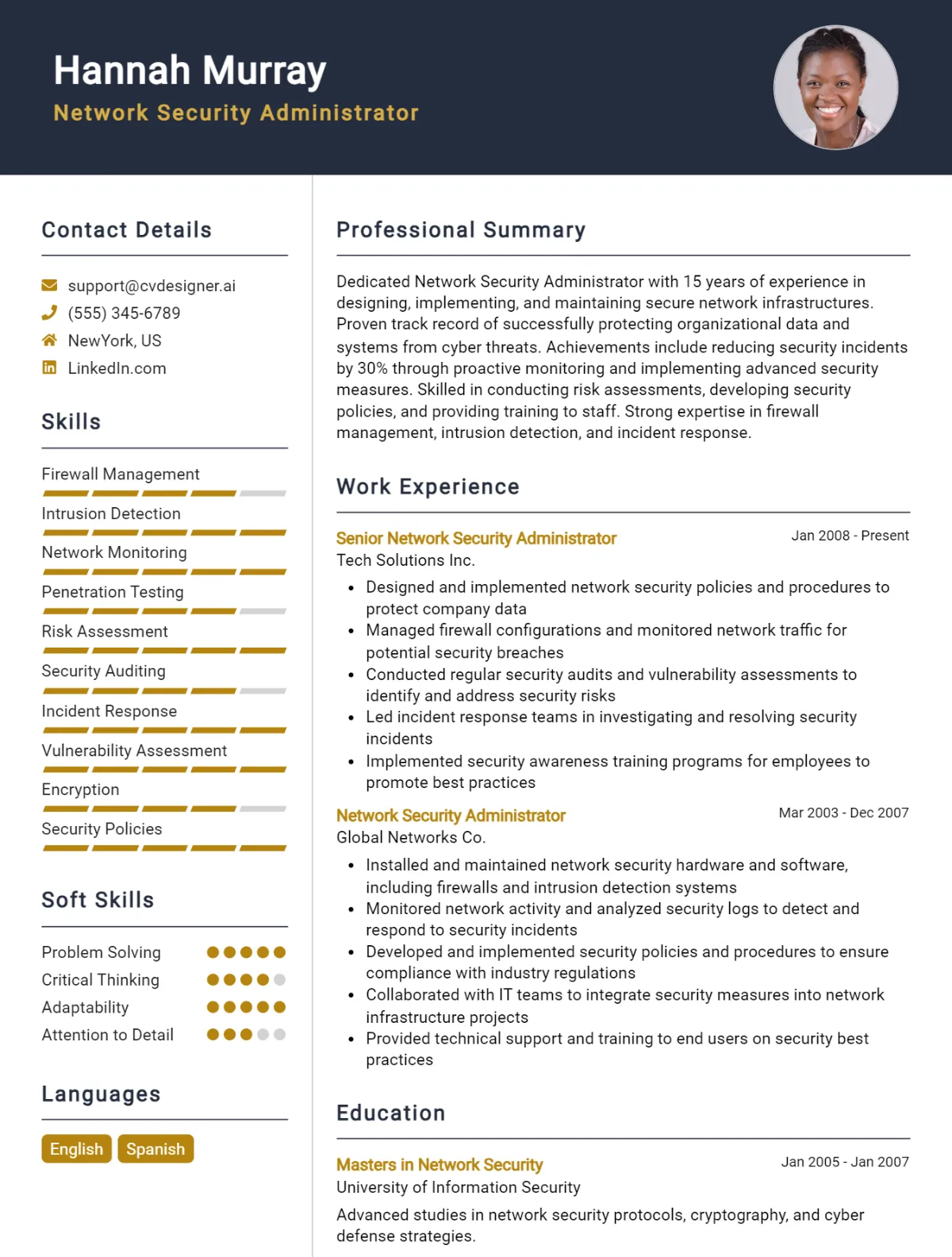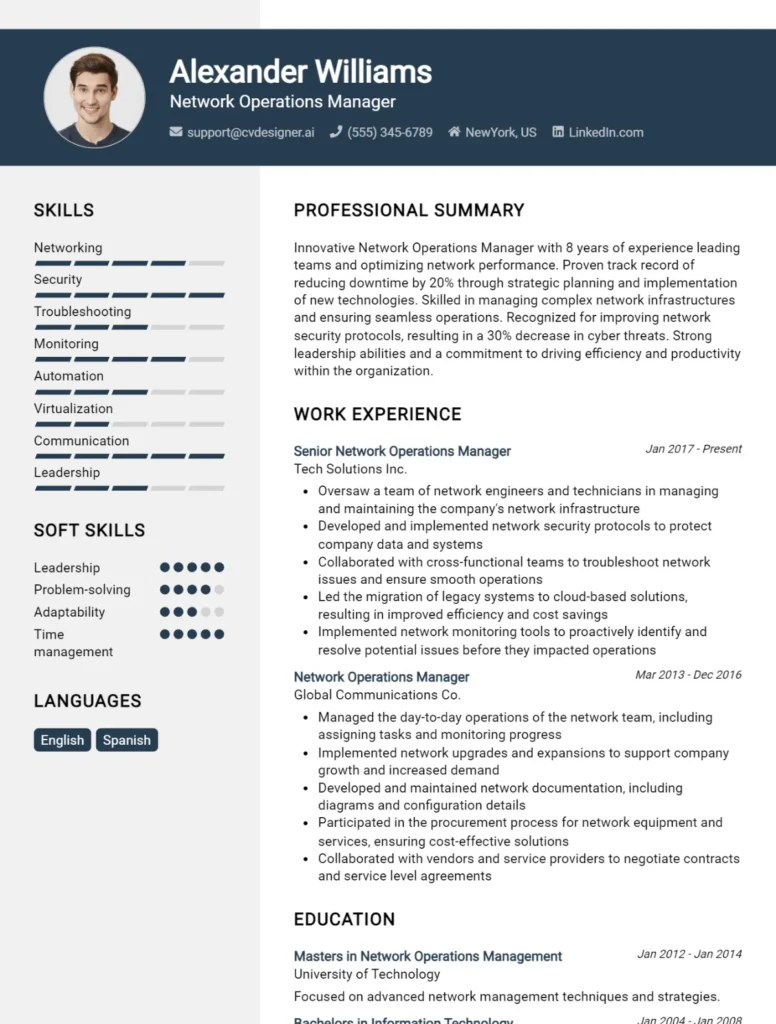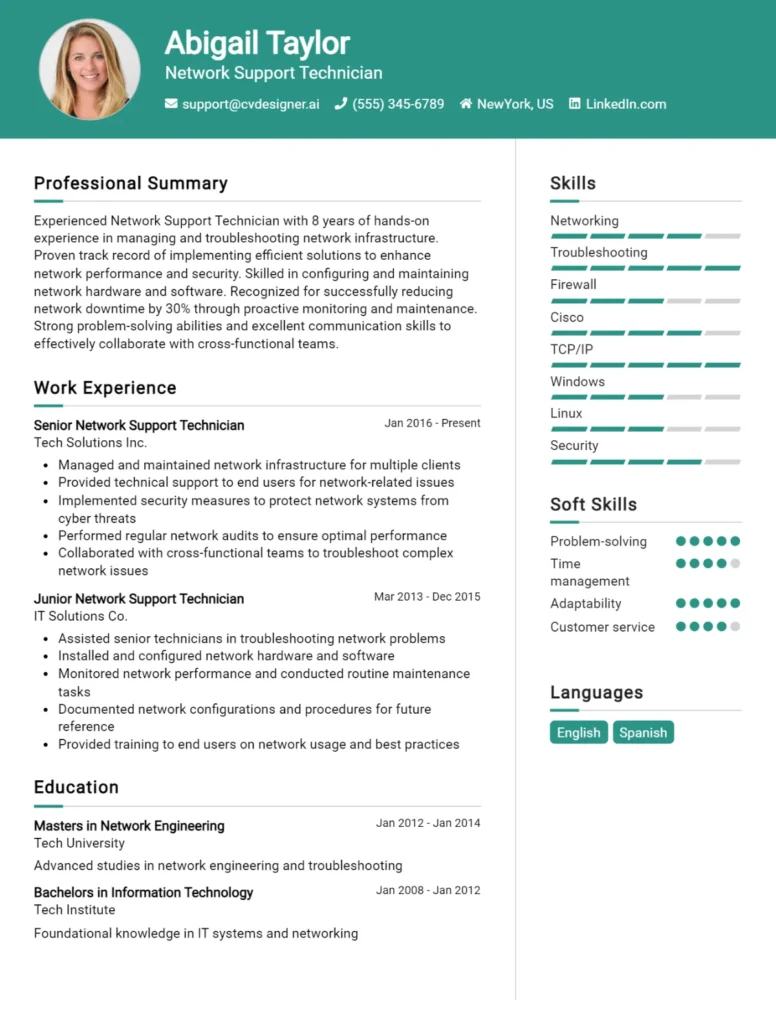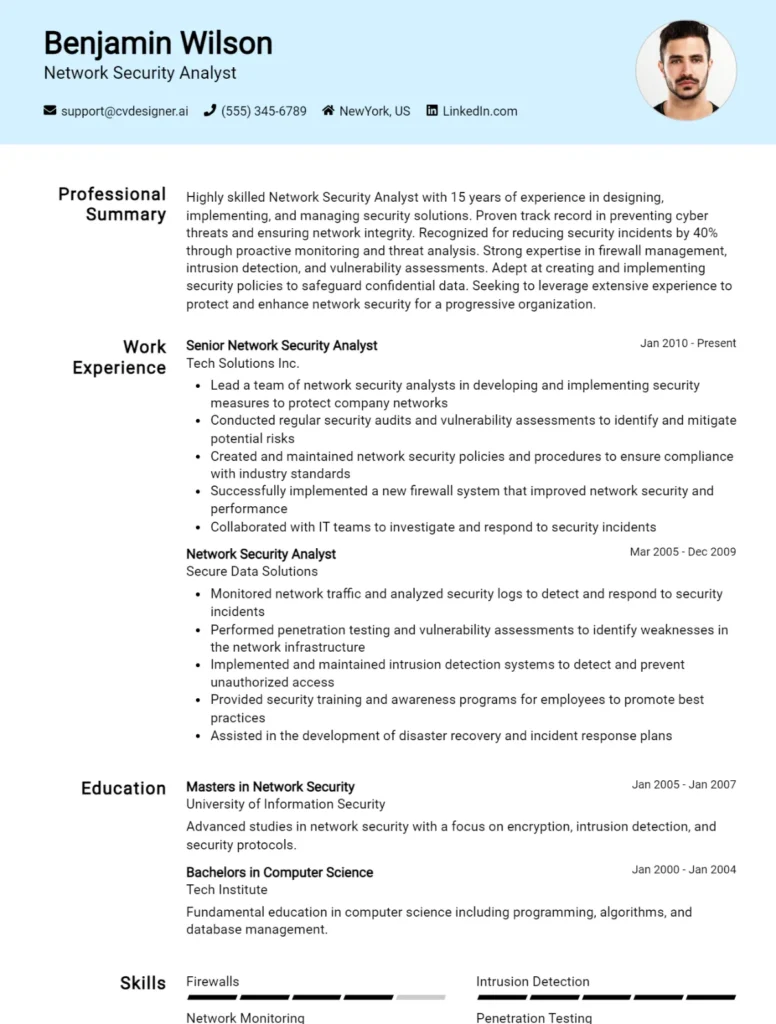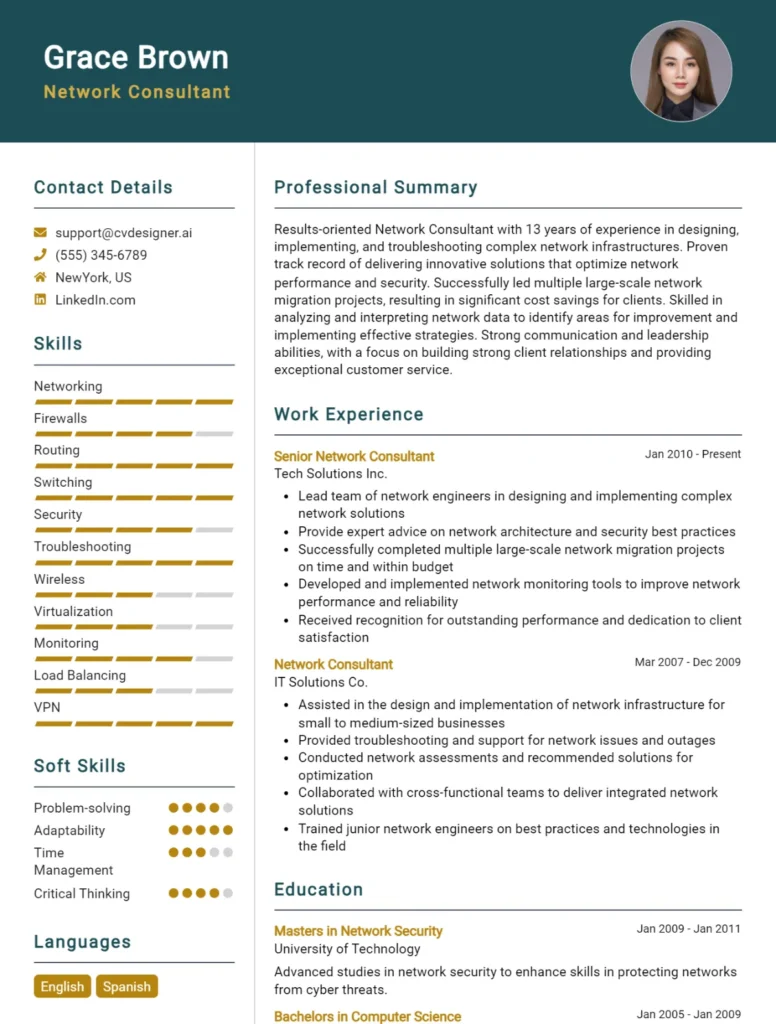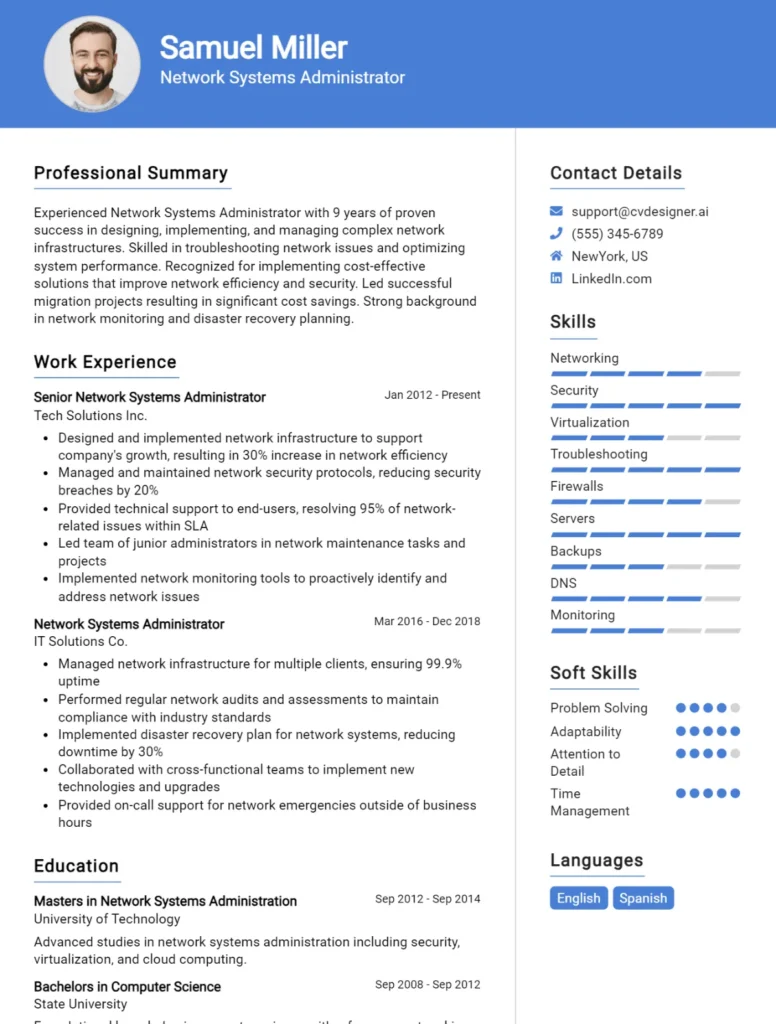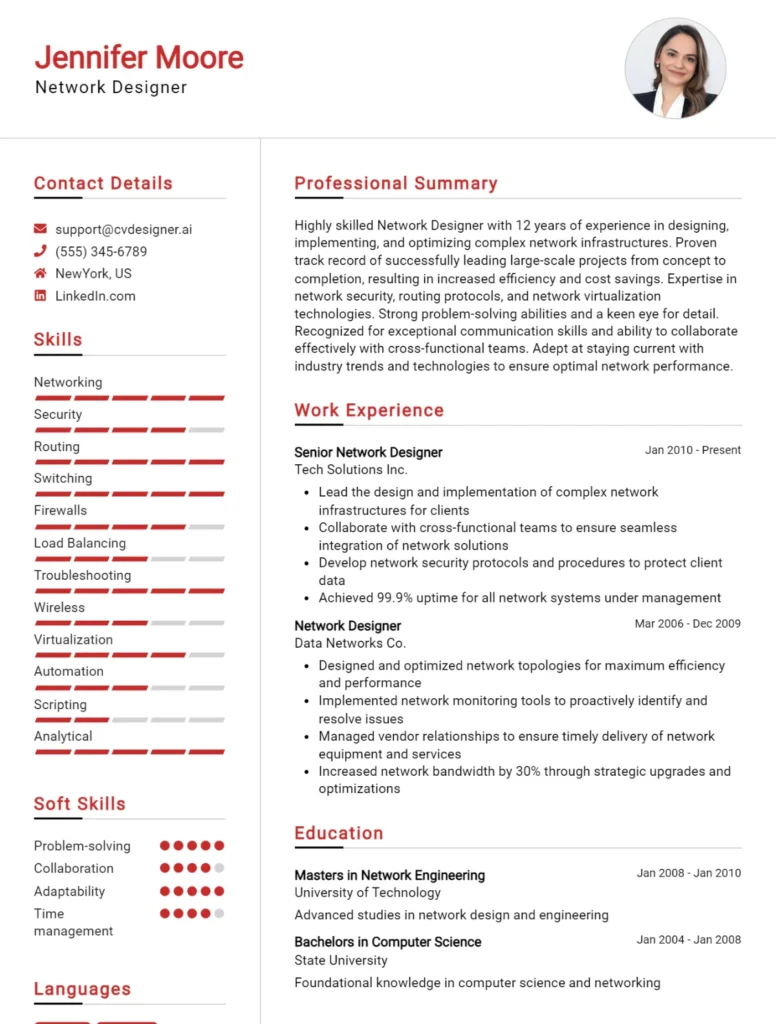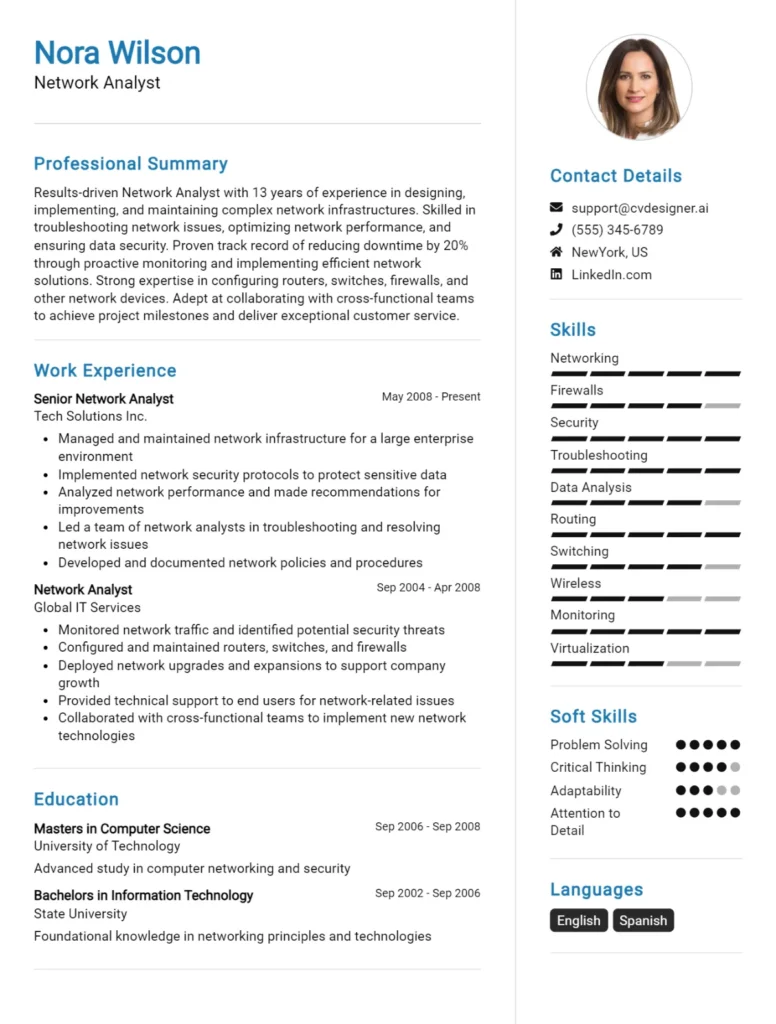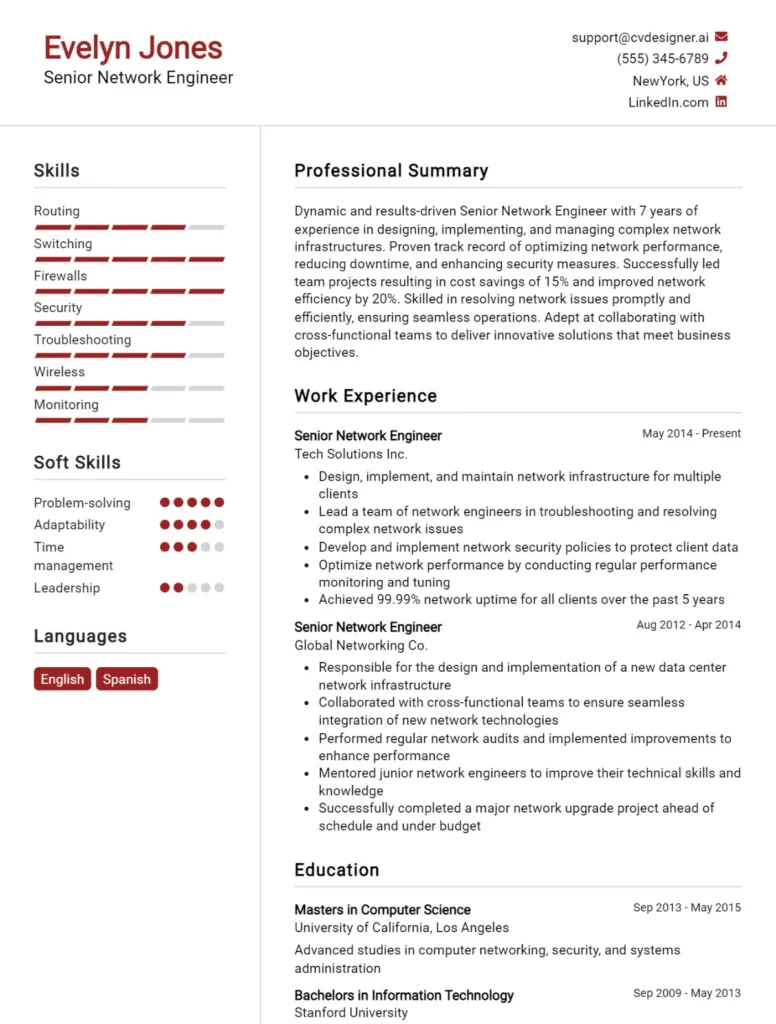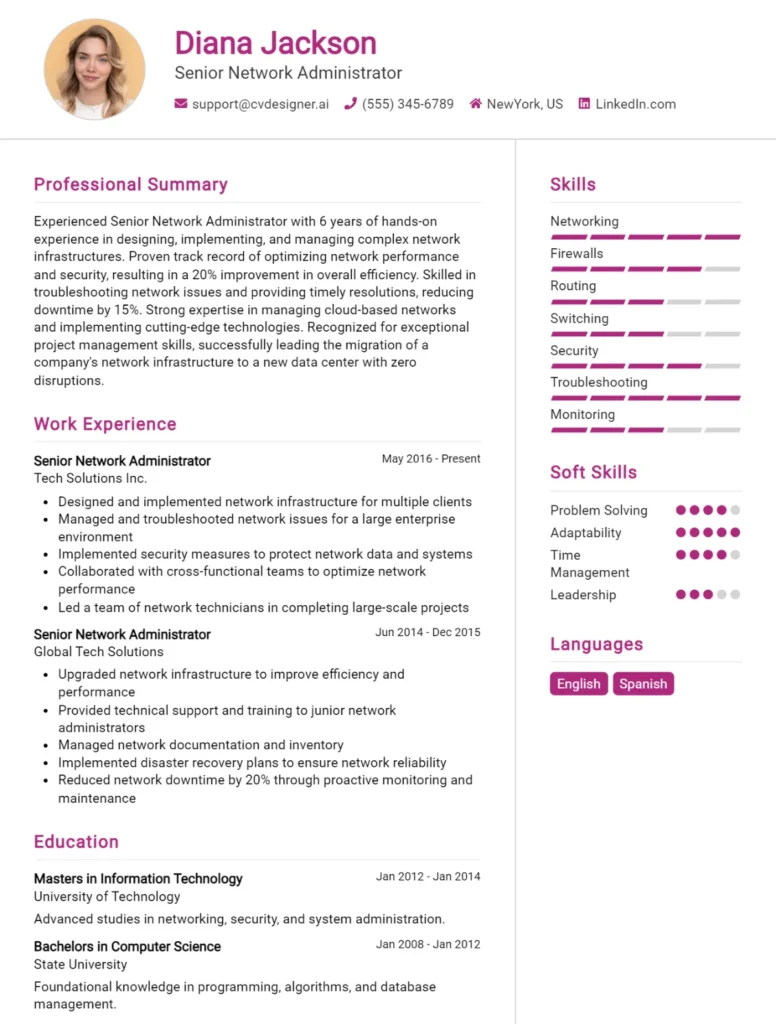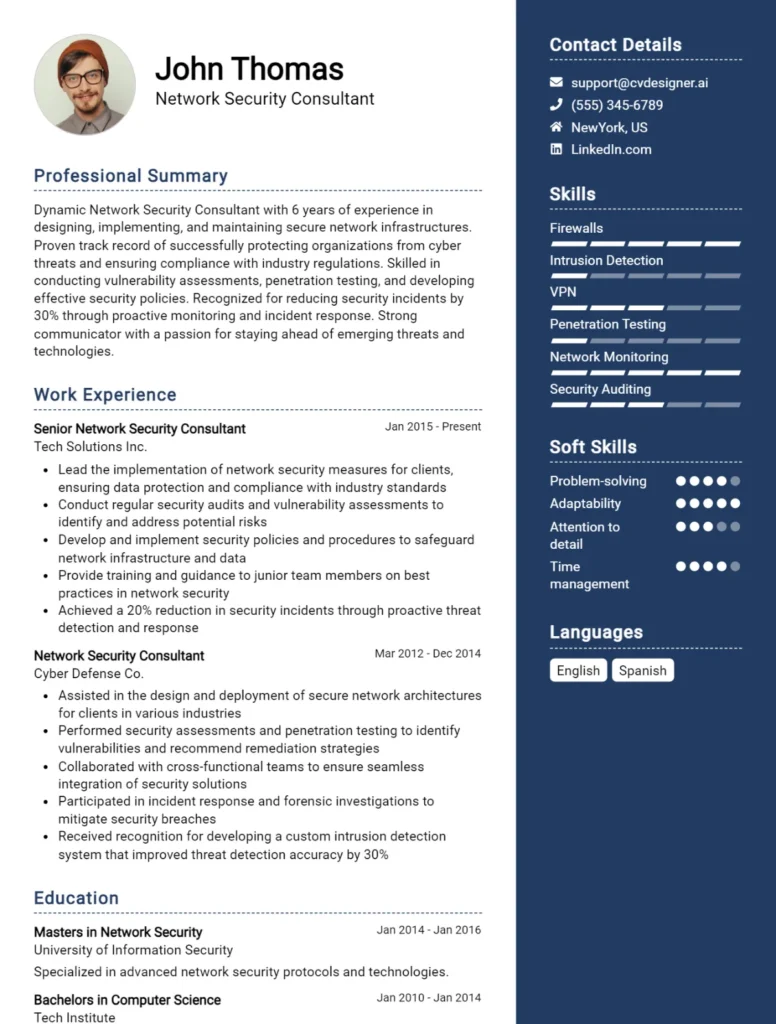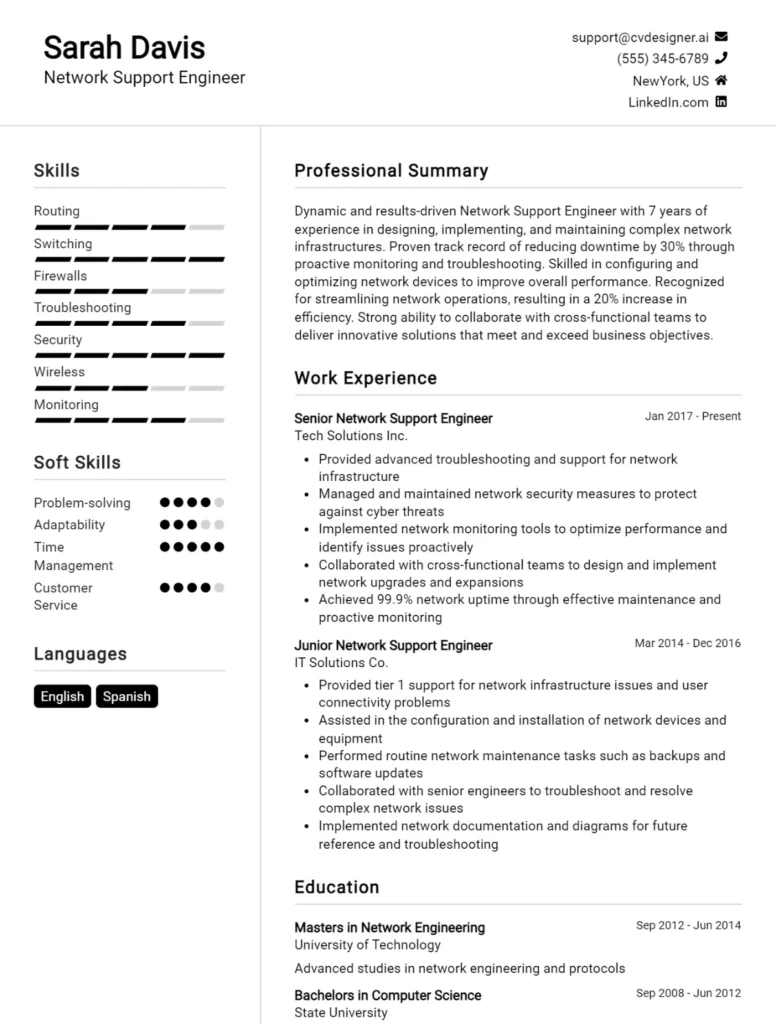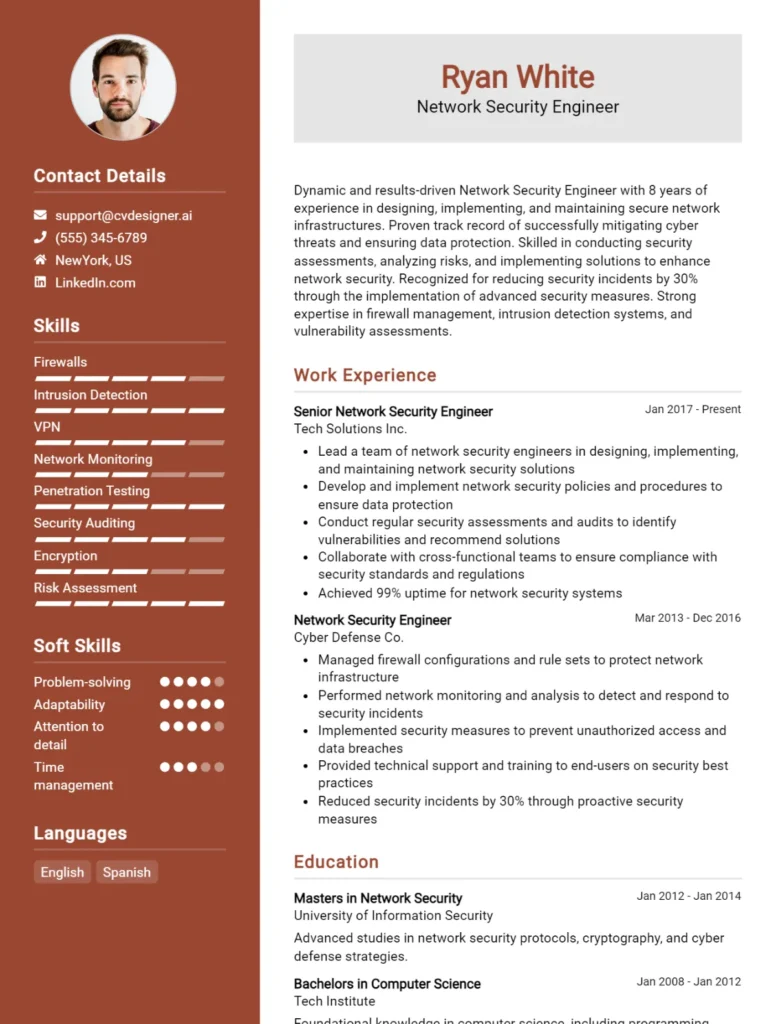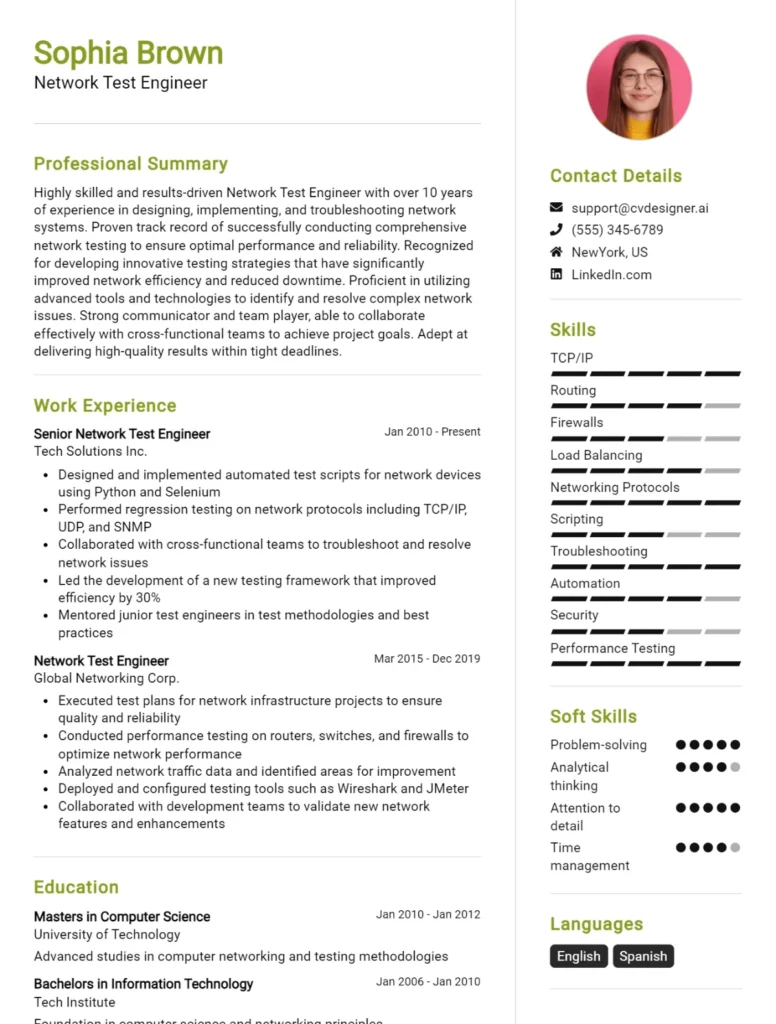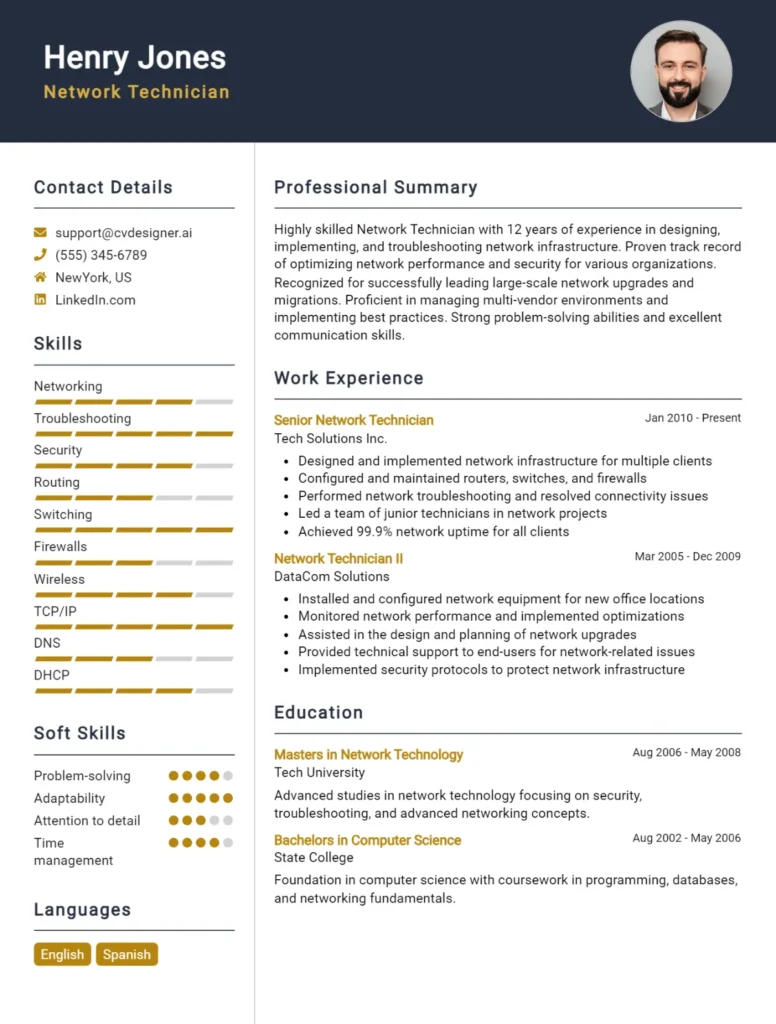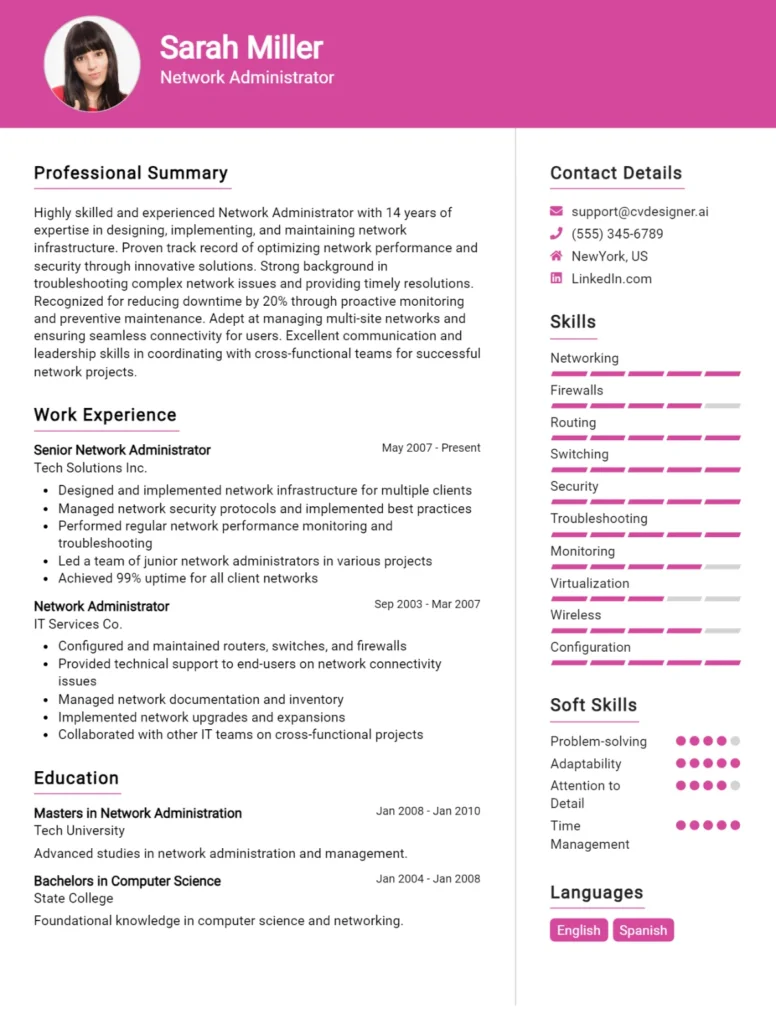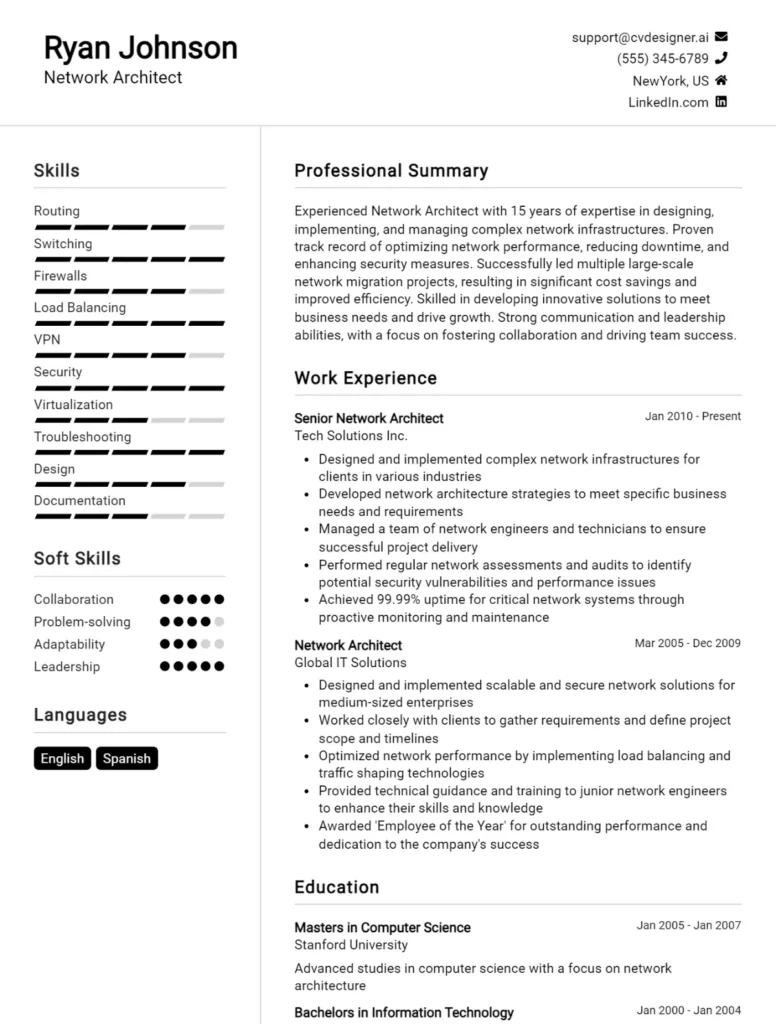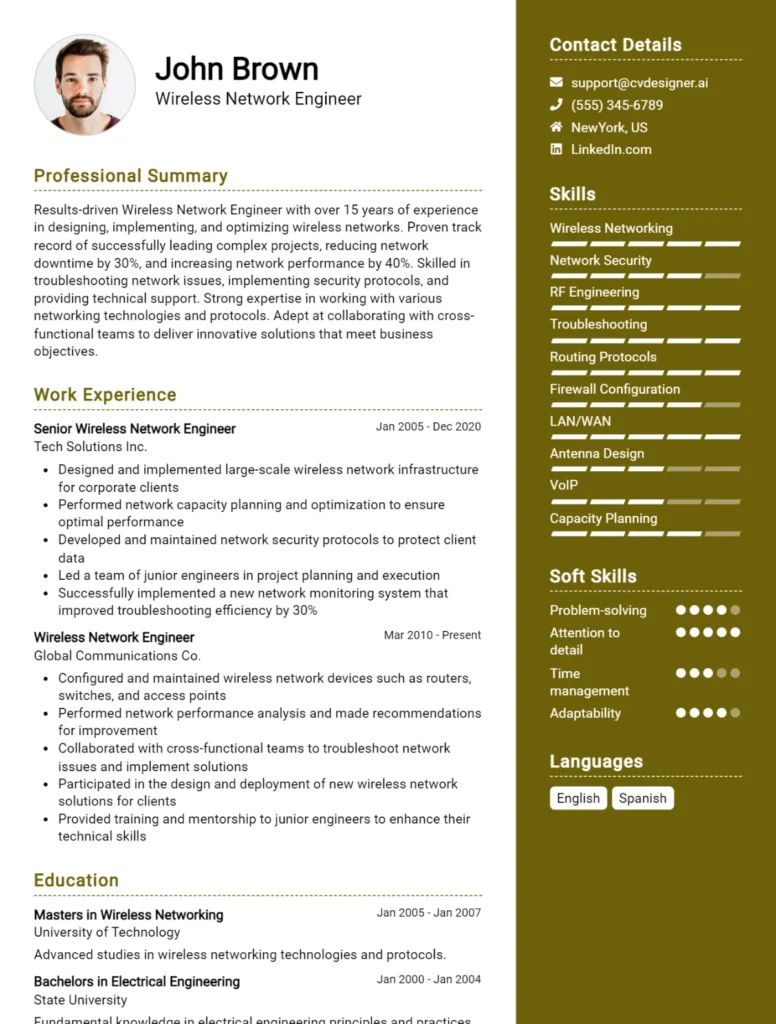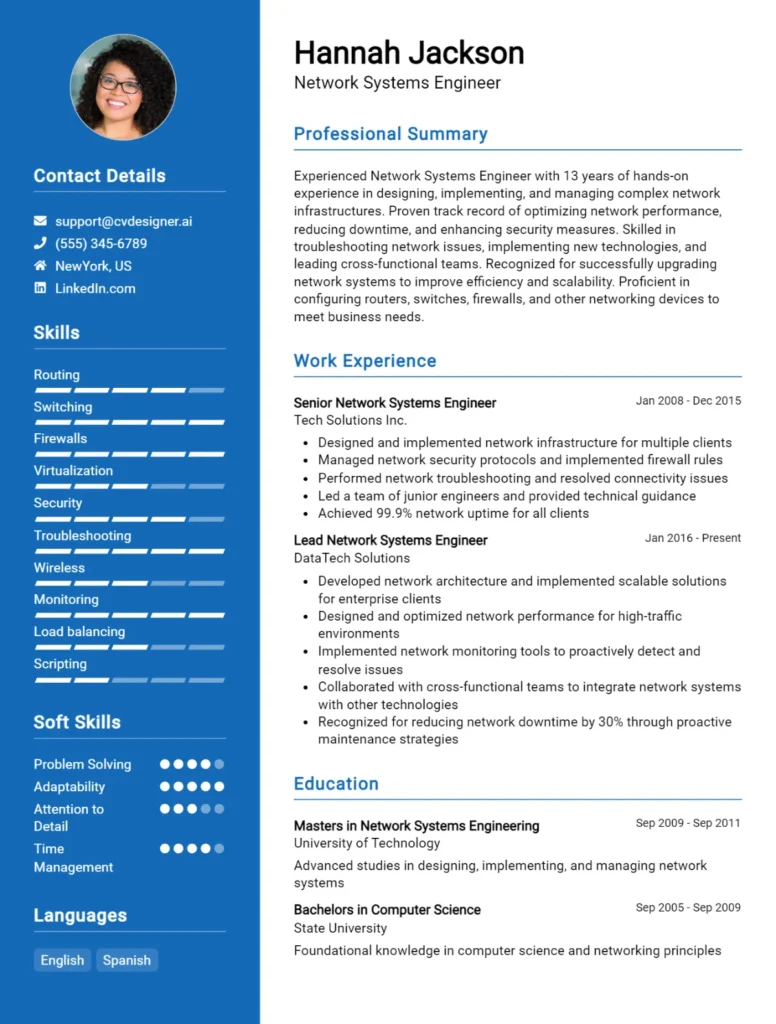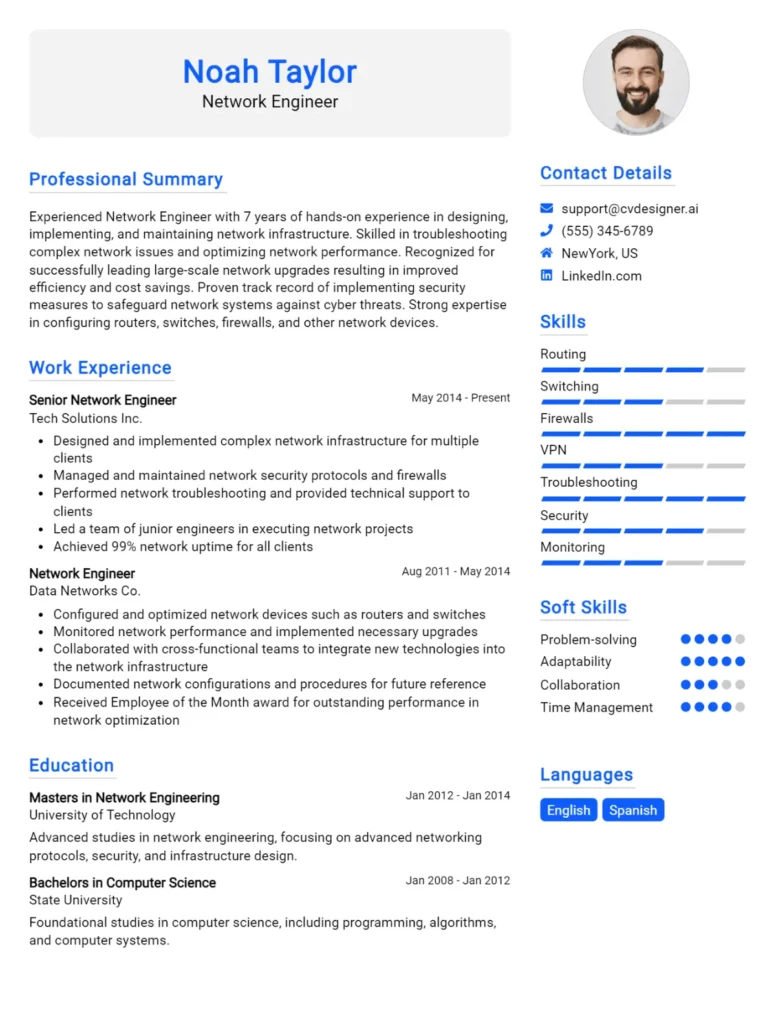Most Popular Network Security Administrator CV Examples
Explore additional Network Security Administrator CV samples and guides and see what works for your level of experience or role.
As the digital landscape continues to evolve, the demand for skilled Network Security Administrators has never been more critical. Crafting a compelling CV is your first step toward securing a position in this dynamic field. In this article, we will guide you through the essentials of writing an effective CV tailored specifically for Network Security Administrators. Whether you're a seasoned professional or just starting your career, our comprehensive guide will provide you with valuable insights and practical tips to showcase your skills and experience. You’ll learn how to highlight your technical competencies, emphasize relevant certifications, and articulate your achievements in a way that stands out to potential employers.
Here’s what you can expect to find in this guide:
- Understanding the Role: Key responsibilities and skills of a Network Security Administrator.
- CV Structure: Effective layout and formatting tips for clarity and professionalism.
- Essential Sections: What to include in your CV, from contact information to professional summary.
- Highlighting Skills: How to showcase your technical and soft skills effectively.
- Certifications and Education: The importance of certifications and how to present your educational background.
- Experience Showcase: Tips for detailing your work experience and achievements.
- Tailoring Your CV: Customizing your CV for different job applications.
- Common Mistakes: Pitfalls to avoid when crafting your CV.
With these insights, you’ll be equipped to create a CV that not only captures your qualifications but also resonates with hiring managers in the field of network security. Let’s dive in and empower your job search with a standout CV!
What is a Network Security Administrator CV?
A Network Security Administrator CV is a crucial document that outlines an individual's professional qualifications, skills, and experiences relevant to safeguarding an organization’s network infrastructure. This CV serves not only as a summary of the applicant's technical expertise, such as knowledge of firewalls, intrusion detection systems, and security protocols, but also highlights their ability to respond to and mitigate security threats. An effective CV can significantly enhance a candidate's chances of landing an interview by presenting their qualifications in a clear and concise manner. For further insights on crafting an impactful CV, refer to this comprehensive cv writing guide.
The importance of a well-structured CV for a Network Security Administrator cannot be overstated, as it is often the first point of contact with potential employers. It allows candidates to demonstrate not only their technical skills but also their problem-solving abilities, attention to detail, and understanding of cybersecurity best practices. A tailored CV can differentiate applicants in a competitive job market, showcasing their unique experiences and accomplishments. To streamline the CV creation process, consider using a dedicated cv maker that offers templates and guidance tailored to your field.
Key Components of a Network Security Administrator CV
- Contact Information: Clearly display your name, phone number, email address, and LinkedIn profile.
- Professional Summary: A brief overview highlighting your expertise in network security, relevant certifications, and career goals.
- Certifications: List network security-related certifications such as CISSP, CEH, CISM, or CompTIA Security+ to showcase your qualifications.
- Technical Skills: Detail your skills in areas such as firewalls, intrusion detection systems, VPNs, and network monitoring tools. For more on this, check out our skills section.
- Work Experience: Provide a detailed account of your previous roles, emphasizing responsibilities and achievements in network security. For guidance, refer to our work experience section.
- Education: Include your highest degree, relevant coursework, and any specialized training in IT or network security.
- Projects: Highlight specific projects or initiatives you've led or contributed to that demonstrate your ability to enhance security protocols.
- Professional Affiliations: Mention memberships in relevant organizations, such as ISACA or (ISC)², to showcase your commitment to the field.
- Soft Skills: Emphasize interpersonal skills like problem-solving, communication, and teamwork that are essential for collaborating with teams.
- Tools and Technologies: Mention specific software and hardware you are proficient with, such as Cisco, Palo Alto, or Wireshark.
- Achievements: Include any awards or recognitions received for your work in network security or related areas.
- Continuing Education: List any ongoing training, workshops, or courses you are pursuing to stay current in the rapidly evolving field of network security.
Sample Network Security Administrator CV for Inspiration
John Doe
123 Main Street
City, State, Zip
(123) 456-7890
john.doe@email.com
LinkedIn: linkedin.com/in/johndoe
Professional Summary
Detail-oriented and dedicated Network Security Administrator with over 6 years of experience in designing, implementing, and maintaining secure network infrastructures. Proven expertise in firewalls, intrusion detection systems, and vulnerability assessments. Adept at implementing security best practices and ensuring compliance with industry standards. Excellent problem-solving skills and a commitment to enhancing organizational security posture.
Work Experience
Network Security Administrator
XYZ Corporation, City, State
June 2019 – Present
- Developed and implemented security policies and procedures to safeguard organization’s information and technology assets.
- Managed and configured firewalls, VPNs, and IDS/IPS systems to prevent unauthorized access and threats.
- Conducted regular vulnerability assessments and penetration testing, resulting in a 30% reduction in security incidents.
- Collaborated with IT teams to design and deploy secure network architecture for cloud and on-premises environments.
- Provided training and awareness programs for employees on security best practices and incident response procedures.
Network Security Analyst
ABC Tech Solutions, City, State
March 2016 – May 2019
- Monitored network traffic for unusual activity and responded to security breaches, minimizing potential damage.
- Assisted in the deployment and maintenance of security tools and technologies, including DLP, SIEM, and endpoint protection.
- Conducted risk assessments and audits to ensure compliance with company policies and regulatory requirements.
- Generated detailed reports on security incidents and proposed recommendations for improvement to upper management.
- Engaged in continuous learning to stay updated with the latest security trends and threats.
IT Support Technician
Tech Innovations, City, State
January 2015 – February 2016
- Provided technical support and troubleshooting for hardware and software issues, enhancing user productivity.
- Assisted in the implementation of security protocols and monitoring systems to protect sensitive data.
- Developed user documentation and training materials to educate employees on IT security policies.
- Maintained accurate records of support requests and resolutions to improve response efficiency.
Education
Bachelor of Science in Computer Science
University of Technology, City, State
Graduated: May 2014
Skills
- Proficient in network security tools (Cisco ASA, Fortinet, Palo Alto, Snort)
- Strong knowledge of TCP/IP, VPN, firewall configuration, and security protocols (SSL, IPsec)
- Experience with vulnerability scanning tools (Nessus, Qualys) and SIEM solutions (Splunk, ArcSight)
- Familiarity with regulatory compliance (GDPR, HIPAA, PCI-DSS)
- Excellent analytical and problem-solving abilities
- Strong communication and team collaboration skills
Certifications
- Certified Information Systems Security Professional (CISSP)
- CompTIA Security+
- Cisco Certified Network Associate (CCNA) Security
- Certified Ethical Hacker (CEH)
Publications
- "Best Practices for Network Security in the Age of IoT," Journal of Cybersecurity, June 2022.
- "Understanding the Importance of Threat Intelligence," Tech Security Insights, September 2021.
Network Security Administrator CV Writing Tips
When crafting a CV for a Network Security Administrator position, it's essential to showcase both your technical expertise and your understanding of security protocols. Begin with a strong summary that highlights your experience in network security, risk assessment, and incident response. Be sure to tailor your CV to the specific job description, using relevant keywords that demonstrate your familiarity with industry standards and tools. Quantify your achievements where possible, as this adds credibility to your skills and shows potential employers the impact you've made in previous roles. Additionally, include any relevant certifications, as they can significantly enhance your profile in a competitive job market.
- Highlight Relevant Certifications: Include certifications such as CISSP, CISM, or CompTIA Security+ to demonstrate your qualifications.
- Focus on Technical Skills: Clearly outline your proficiency with firewalls, intrusion detection systems, VPNs, and other essential security technologies.
- Quantify Achievements: Use metrics to showcase your successes, such as reduced security incidents or improved response times.
- Tailor Your CV: Customize your CV for each application by incorporating keywords and phrases from the job description.
- Showcase Soft Skills: Emphasize communication, problem-solving, and teamwork abilities, as these are crucial in security roles.
- Include Relevant Experience: Detail your previous roles in network security, specifying your responsibilities and contributions.
- Keep It Concise: Aim for a clean, easy-to-read format that presents information clearly, ideally within one to two pages.
- Proofread Thoroughly: Ensure your CV is free from spelling and grammatical errors, as attention to detail is vital in security positions.
Network Security Administrator CV Summary Examples
As a Network Security Administrator, your CV summary should succinctly highlight your expertise in protecting sensitive data and ensuring the integrity of network systems. An effective summary not only showcases your technical skills but also emphasizes your ability to mitigate risks and respond to security incidents. Here are several examples of impactful CV summaries tailored for this role:
Detail-oriented Network Security Administrator with over 5 years of experience in designing, implementing, and managing security protocols for corporate networks. Proven track record in identifying vulnerabilities and mitigating risks while ensuring compliance with industry standards.
Results-driven Network Security Administrator skilled in deploying advanced security technologies and conducting threat analysis. Expertise in incident response and recovery, with a commitment to maintaining the highest standards of data integrity and system availability.
Dynamic Network Security Administrator with a strong background in firewall management, intrusion detection systems, and risk assessment. Adept at collaborating with cross-functional teams to foster a culture of security awareness and proactive defense.
Highly analytical Network Security Administrator with 7 years of experience in safeguarding enterprise networks from cyber threats. Proficient in developing and enforcing security policies and procedures, resulting in a significant reduction in security incidents.
Dedicated Network Security Administrator with extensive knowledge of network protocols and security architectures. Strong problem-solving skills and a passion for staying updated on the latest cybersecurity trends and technologies to enhance organizational security posture.
Build a Strong Experience Section for Your Network Security Administrator CV
As a Network Security Administrator, your experience section should highlight your expertise in safeguarding an organization's network infrastructure. Use action verbs and quantifiable achievements to showcase your skills and contributions effectively. Here are some strong work experience examples to include in your CV:
- Developed and implemented comprehensive security policies and procedures, reducing security incidents by 30% over two years, while ensuring compliance with industry standards such as ISO 27001 and NIST.
- Managed the installation and configuration of firewall and intrusion detection systems (IDS), resulting in a 40% decrease in unauthorized access attempts and improved overall network security posture.
- Conducted regular vulnerability assessments and penetration testing, identifying critical vulnerabilities and leading remediation efforts that enhanced the security of sensitive data and applications.
- Collaborated with IT teams to design and deploy a secure VPN solution, enabling remote access for over 200 employees while maintaining compliance with regulatory requirements.
- Monitored network traffic using advanced security tools, producing weekly reports that informed management about potential threats and facilitated proactive responses to emerging security incidents.
- Led training sessions for staff on security best practices, increasing employee awareness and adherence to security protocols, which contributed to a 25% reduction in phishing-related incidents.
- Responded to security breaches and incidents by conducting thorough investigations and implementing corrective actions, effectively minimizing downtime and ensuring the integrity of critical systems.
- Evaluated and recommended new security technologies, successfully integrating a next-generation firewall that improved threat detection capabilities and reduced false positives by 50%.
Network Security Administrator CV Education Examples
As a Network Security Administrator, having a solid educational foundation is crucial for understanding the complexities of network infrastructure, security protocols, and best practices. Below are several examples of educational backgrounds that can be beneficial for aspiring professionals in this field.
- Bachelor's Degree in Computer Science: This degree provides a comprehensive understanding of computer systems, programming, and network fundamentals, equipping graduates with the technical skills necessary for network security.
- Bachelor's Degree in Information Technology: An IT degree focuses on the application of technology in business environments, covering topics related to network management, systems administration, and security measures.
- Bachelor's Degree in Cybersecurity: Specifically tailored for security roles, this degree emphasizes risk management, intrusion detection, and secure network design, preparing students for the challenges of protecting digital assets.
- Associate's Degree in Network Administration: This program offers foundational knowledge in networking technologies, protocols, and security practices, making it an excellent starting point for those entering the field.
- Certificates in Network Security or Ethical Hacking: Specialized certifications, such as CompTIA Security+, Certified Ethical Hacker (CEH), or Cisco Certified Network Associate (CCNA) Security, can complement formal education and demonstrate a commitment to ongoing professional development in network security.
Skills to Highlight in Your Network Security Administrator CV
As a Network Security Administrator, possessing a blend of technical expertise and interpersonal abilities is crucial for ensuring the integrity, confidentiality, and availability of an organization’s network systems. Highlighting the right skills in your CV can significantly enhance your chances of landing an interview. Below is a curated list of both soft and hard skills that are essential for a successful career in network security.
Soft Skills:
- Problem-solving
- Attention to detail
- Critical thinking
- Communication skills
- Team collaboration
- Adaptability
- Time management
- Analytical mindset
- Conflict resolution
- Customer service orientation
Hard Skills:
- Knowledge of firewalls and intrusion detection systems (IDS)
- Proficiency in network protocols (TCP/IP, DNS, DHCP, etc.)
- Experience with security information and event management (SIEM) tools
- Familiarity with identity and access management (IAM)
- Understanding of encryption technologies
- Vulnerability assessment and penetration testing
- Network monitoring and analysis tools
- Incident response and disaster recovery planning
- Compliance with security standards (e.g., ISO 27001, NIST)
- Scripting and programming skills (e.g., Python, Bash)
Network Security Administrator CV Format
As a Network Security Administrator, crafting a compelling CV is crucial for showcasing your expertise and experience in the field of cybersecurity. The right format can significantly impact how potential employers perceive your qualifications. Depending on your job level—entry-level, mid-level, or senior-level—the CV format may vary to highlight the most relevant skills and experiences.
For entry-level positions, a chronological format that emphasizes education and relevant coursework is often best. For mid-level roles, a combination format that balances work experience with skills and certifications can be effective. Senior-level candidates may benefit from a functional format that showcases leadership roles and strategic contributions.
- Start with a strong summary statement that highlights your experience in network security and relevant certifications.
- List your technical skills prominently, including firewalls, intrusion detection systems, and VPN technologies.
- Detail your work experience in reverse chronological order, ensuring to include key achievements that demonstrate your impact on network security.
- Include relevant certifications such as CompTIA Security+, CISSP, or CEH to validate your expertise.
- Highlight any experience with compliance standards (e.g., GDPR, HIPAA) and your role in maintaining security protocols.
- Showcase your ability to collaborate with cross-functional teams and communicate complex security concepts to non-technical stakeholders.
For more comprehensive guidance on CV formats, you can explore this cv format resource.
Common Mistakes to Avoid in a Network Security Administrator CV
When crafting a CV for the role of a Network Security Administrator, it's crucial to present your skills and experiences effectively to stand out in a competitive job market. Highlighting your technical expertise and understanding of network security protocols is essential, but there are common pitfalls to avoid that could undermine your chances of landing an interview. Below are some of the frequent mistakes candidates make when preparing their CVs:
- Failing to customize the CV for each job application, leading to a generic impression.
- Overloading the document with technical jargon without explaining their relevance or context.
- Neglecting to quantify achievements, such as specifying the percentage of security incidents reduced.
- Using an unprofessional email address or a cluttered format that detracts from readability.
- Omitting important certifications or training relevant to network security, such as CISSP or CEH.
- Listing job responsibilities instead of focusing on accomplishments and contributions to previous employers.
- Not including soft skills, like teamwork or communication, that are crucial for collaborating with other IT professionals.
- Ignoring the importance of a clear, concise summary or objective statement that outlines career goals and expertise.
- Failing to proofread for spelling and grammatical errors, which can signal a lack of attention to detail.
- Listing outdated technologies or skills that may not be relevant to current network security trends.
Key Takeaways for a Network Security Administrator CV
- Contact Information: Clearly present your name, phone number, email address, and LinkedIn profile at the top of your CV for easy access.
- Professional Summary: Write a concise summary that highlights your experience in network security, showcasing your skills and career objectives.
- Relevant Certifications: List certifications such as Certified Information Systems Security Professional (CISSP), Certified Ethical Hacker (CEH), or CompTIA Security+ to demonstrate your qualifications in network security.
- Technical Skills: Include a section detailing your proficiency with firewalls, intrusion detection systems, VPNs, and security protocols (e.g., SSL, IPsec).
- Experience Section: Focus on your previous roles, emphasizing achievements and responsibilities that relate to network security, such as incident response and vulnerability assessments.
- Projects: Highlight specific projects you’ve worked on that involved network security enhancements, detailing your role and the outcomes achieved.
- Education: Provide your educational background, including degrees earned and any relevant coursework in cybersecurity or information technology.
- Soft Skills: Mention crucial soft skills like problem-solving, attention to detail, and effective communication, which are essential for collaborating with IT teams.
- Professional Affiliations: List memberships in professional organizations, such as ISACA or (ISC)², to show your commitment to the field.
- Tailored CV: Customize your CV for each job application to align your skills and experiences with the specific requirements of the position.
- Additional Resources: Utilize cv templates to enhance the layout of your CV and consider using a cv builder for an efficient creation process.
- Cover Letter: Don’t forget to create a compelling cover letter using cover letter templates that complements your CV and highlights your motivation for the role.
Build your CV in minutes
Use an AI-powered cv builder and have your cv done in 5 minutes. Just select your template and our software will guide you through the process.
